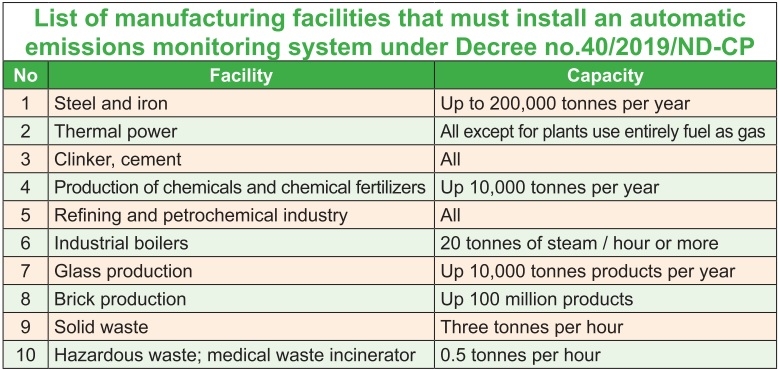Charges proposed for gas emitters
 |
Large manufacturers that emit large amounts of emissions such as cement, coal, thermoelectricity, steel, chemicals may eventually be affected by a new emissions-related fee in the short-term, depending on the final plan released by the Ministry of Finance (MoF).
The MoF has been urging the Ministry of Natural Resources and Environment (MoNRE), the Ministry of Construction (MoC), and the Ministry of Transport to formulate a plan in June to collect the emission-related fee, which has been stipulated in the existing Law on Environmental Protection 2014.
At last week’s meeting in Hanoi on discussing measures to control air pollution and improving air quality in areas such as the capital and also in Ho Chi Minh City, a proposal was made to collect this type of fee.
However, the MoC argued in a document that the plan to collect such charges “should be carefully studied with the current practical situation, in order to ensure the science and feasibility in the collection process.” The document stated, “The collection of the fee should be clearly identified in order to avoid overlapping of liable subjects.”
The MoNRE is responsible for completing legal frameworks and policies on environmental protection, building and promulgating technical standards on emissions and air quality, which must be close to standards of other countries worldwide.
A draft law revising the Law on Environment Protection 2014 has been advanced to the National Assembly and will be discussed from next week. It is expected to reduce administrative procedures without affecting environmental protection management, and add provisions on environmental protection associated with sustainable development.
According to the Vietnam Law and Legal Forum, regarding management of air environment quality, the MoNRE would issue a technical guideline to produce an air quality index and guide local air quality management planning. Provincial-level people’s committees would be responsible for approving and implementing air quality management plans in their localities; regularly assess, monitor, and publicise information on air quality; and provide warnings and prompt solutions in case of air environment pollution, the forum added.
Organisations and individuals causing air pollution or degradation would have to take remedies for pollution and carry out environmental rehabilitation.
The MoC admitted that under Decree No.40/2019/ND-CP on amendments to decrees guiding the implementation of the Law on Environmental Protection, it provides for a license to release emissions into the environment. But due to a lack of information and a database on emissions, the MoNRE does not have specific instructions on this licence.
Tran Quang Cung, chairman of the Vietnam Cement Association, said that cement enterprises are currently paying environmental taxes, so the collection of additional emissions fees should be considered in harmony.
“It is necessary to create an appropriate emission fee collection mechanism to encourage enterprises to invest more in production technologies, reduce emissions, and clean up the environment in the long term. However, it cannot achieve the purpose of cleaning the environment if we have no specific database or transparent fees,” said Cung.
Green ID Vietnam, a non-profit group promoting sustainable development in the country, reported that resources for organisations, people, and equipment and for the management of emissions sources are very limited. The monitoring centre lacks many emission monitoring devices, and even lacks equipment such as computers to receive online data from production facilities.
Over the years, Vietnam has been one of the countries with high growth rates in the region and strong manufacturing industries.
It is one of the main causes of air pollution when the number of factories of some industries with large gas emissions has increased, such as thermal power (25 plants); cement (more than 60 factories); steel (nearly 50 factories); and chemicals facilities and thousands of small production facilities in metal recycling, plastic, and paper recycling villages.
The two biggest cities of Hanoi and Ho Chi Minh City are trying to minimise the negative effects of air pollution, which has risen to dangerous levels in recent times as monitored by various air quality applications. The two intend to ban motorbikes in the city centre by 2030 as part of a strategy to cut exhaust emissions.
What the stars mean:
★ Poor ★ ★ Promising ★★★ Good ★★★★ Very good ★★★★★ Exceptional
 Tag:
Tag:
Related Contents
Latest News
More News
- NAB Innovation Centre underscores Vietnam’s appeal for tech investment (January 30, 2026 | 11:16)
- Vietnam moves towards market-based fuel management with E10 rollout (January 30, 2026 | 11:10)
- Vietnam startup funding enters a period of capital reset (January 30, 2026 | 11:06)
- Vietnam strengthens public debt management with World Bank and IMF (January 30, 2026 | 11:00)
- PM inspects APEC 2027 project progress in An Giang province (January 29, 2026 | 09:00)
- Vietnam among the world’s top 15 trading nations (January 28, 2026 | 17:12)
- Vietnam accelerates preparations for arbitration centre linked to new financial hub (January 28, 2026 | 17:09)
- Vietnam's IPO market on recovery trajectory (January 28, 2026 | 17:04)
- Digital economy takes centre stage in Vietnam’s new growth model (January 28, 2026 | 11:43)
- EU Council president to visit Vietnam amid partnership upgrade (January 28, 2026 | 11:00)






















 Mobile Version
Mobile Version